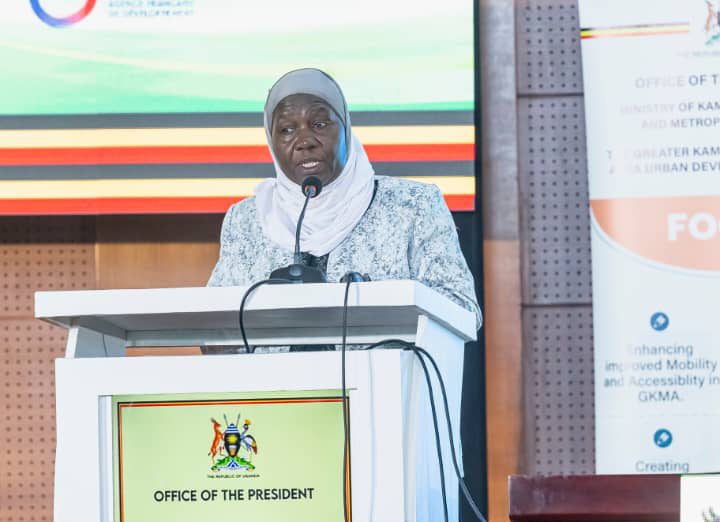Progress in Kampala: '42% say service access has improved'
“This programme is not just about roads and buildings—it’s about improving lives,” Kabanda said. “Our capital city and its people deserve modern, resilient infrastructure that responds to the realities of urban growth.”
During the event, Kabanda called for a more deliberate and consolidated approach, urging development partners to consider extending the program timeline to fully realize its intended impact.
Uganda’s ambitious effort to transform the Greater Kampala Metropolitan Area (GKMA) is gaining momentum, though significant structural and co-ordination challenges continue to hinder its full potential.
This was revealed during the mid-term review of the GKMA Urban Development Programme at the President's Office in Kampala on Thursday, September 18, 2025.
Backed by more than $179 million from the World Bank and other development partners, the programme aims to improve infrastructure, institutional governance, service delivery and climate resilience across the capital and surrounding districts. It aligns with Vision 2040, National Development Plans III and IV, and the Sustainable Development Goals (SDGs).
Presiding over the event, Kampala affairs minister Hajjat Minsa Kabanda praised the progress made but urged greater urgency and co-ordination to ensure timely completion.
“This programme is not just about roads and buildings—it’s about improving lives,” Kabanda said. “Our capital city and its people deserve modern, resilient infrastructure that responds to the realities of urban growth.”
She emphasised that Kampala’s transformation is central to Uganda’s long-term development strategy.
“With Uganda’s population projected to reach 100 million by 2050, we must act now to shape our cities for the future. Poor planning is no longer an option.”
The review highlighted key accomplishments, particularly in institutional development and urban governance. Approximately 78% of planned institutional capacity-building activities have been implemented, including new physical development plans, updated governance systems and enhanced property tax frameworks.
“As a result of these reforms, local governments have recorded a 52% increase in their own revenue, which means stronger services, better roads and greater investment,” Kabanda said.
Significant progress has also been made in infrastructure planning, with technical designs completed for over 29.5 kilometres of priority roads.
Community support has played a critical role, with 85% of land access secured voluntarily, reducing compensation costs and fostering public trust.
“This shows our people understand and support the broader vision,” Kabanda added, noting that along the project corridors, 42% of residents reported improved access to services, and 44% noted improved infrastructure resilience.
Ongoing challenges
Despite these gains, the programme faces some challenges, most notably the compressed implementation timeline, shortened from 66 to 48 months.
“This has tightened our execution window and increased pressure on all implementing agencies,” Kabanda said. “Important infrastructure can’t be rushed. We need time to do it right.”
Minister Minsa Kabanda
Delays in Resettlement Action Plans (RAPs) have slowed progress, and limited allocations for operations and maintenance threaten the sustainability of completed projects.
“We must stop treating maintenance as an afterthought,” she warned. “If we don’t invest in operations, our investments risk falling into disrepair.”
Gaps between ministries and technical groups
Co-ordination gaps among ministries and technical working groups have further undermined efficiency.
“Inter-agency collaboration is not a luxury—it’s a necessity,” Kabanda stressed. “I call upon all stakeholders to step up.”
Meanwhile, delays in implementing resilience-building projects—intended to create jobs and mitigate climate risks—have also dampened momentum.
“These are not side projects,” she emphasised. “They are central to protecting our people from rising environmental and economic threats.”
During the event, Kabanda called for a more deliberate and consolidated approach, urging development partners to consider extending the program timeline to fully realize its intended impact.
“Let’s build on the foundation we’ve laid. We don’t need to reinvent the wheel—we need to strengthen it,” she said, cautioning against shifting to alternative financing mechanisms like the Independent Program Financing (IPF) model.
She expressed gratitude to all those involved in the programme—from technical staff and civil servants to development agencies and community leaders.
“To our partners, thank you for standing with Uganda. To our technical teams, thank you for your resilience. And to the people of Kampala—you are the reason we are doing this,” Kabanda said.
“Let us continue working together to build a city—and a country—we can all be proud of.”
Sustainable urban development
On his part, Secretary Office of the President, Hajji Yunus Kakande reaffirmed the government’s commitment to sustainable urban development.
Kakande noted that with Uganda’s population rapidly rising, government's planning must be deliberate and strategic.
He emphasised the Government’s focus on key interventions in mobility, climate resilience and institutional capacity, noting that the support from international partners is already driving results.
“This investment is transforming infrastructure, governance, and service delivery—while creating economic opportunities for millions of Ugandans,” Kakande added.
About the GKMA-UDP
The GKMA-UDP is a government of Uganda initiative aimed at enhancing urban mobility, environmental conditions, local economic development, and coordination in the Greater Kampala Metropolitan Area (GKMA).
Supported by the World Bank and Agence Française de Développement (AFD), the programme is implemented by nine entities, including Kampala Capital City Authority (KCCA), the district local governments of Wakiso, Mukono, and Mpigi, and the respective municipal local governments of Kira, Nansana, Makindye-Ssabagabo, Mukono and Entebbe.
These GKMA entities are responsible for planning, budgeting, implementing, and reporting on the program, ensuring sustainable public procurement principles while upholding environmental and social safeguards.